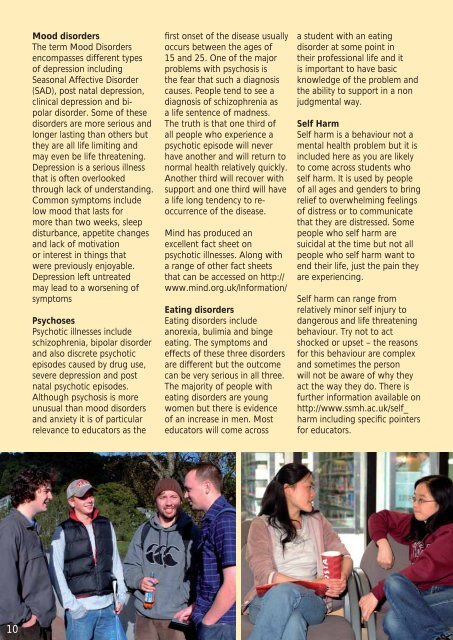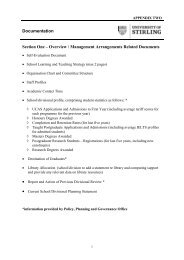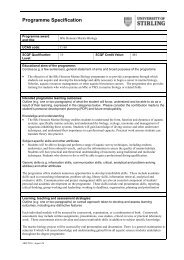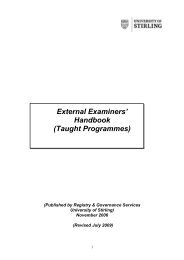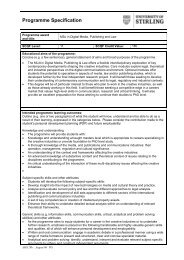Pdf Version (1333Kb) - Quality Assurance - University of Stirling
Pdf Version (1333Kb) - Quality Assurance - University of Stirling
Pdf Version (1333Kb) - Quality Assurance - University of Stirling
Create successful ePaper yourself
Turn your PDF publications into a flip-book with our unique Google optimized e-Paper software.
Mood disorders<br />
The term Mood Disorders<br />
encompasses different types<br />
<strong>of</strong> depression including<br />
Seasonal Affective Disorder<br />
(SAD), post natal depression,<br />
clinical depression and bipolar<br />
disorder. Some <strong>of</strong> these<br />
disorders are more serious and<br />
longer lasting than others but<br />
they are all life limiting and<br />
may even be life threatening.<br />
Depression is a serious illness<br />
that is <strong>of</strong>ten overlooked<br />
through lack <strong>of</strong> understanding.<br />
Common symptoms include<br />
low mood that lasts for<br />
more than two weeks, sleep<br />
disturbance, appetite changes<br />
and lack <strong>of</strong> motivation<br />
or interest in things that<br />
were previously enjoyable.<br />
Depression left untreated<br />
may lead to a worsening <strong>of</strong><br />
symptoms<br />
Psychoses<br />
Psychotic illnesses include<br />
schizophrenia, bipolar disorder<br />
and also discrete psychotic<br />
episodes caused by drug use,<br />
severe depression and post<br />
natal psychotic episodes.<br />
Although psychosis is more<br />
unusual than mood disorders<br />
and anxiety it is <strong>of</strong> particular<br />
relevance to educators as the<br />
first onset <strong>of</strong> the disease usually<br />
occurs between the ages <strong>of</strong><br />
15 and 25. One <strong>of</strong> the major<br />
problems with psychosis is<br />
the fear that such a diagnosis<br />
causes. People tend to see a<br />
diagnosis <strong>of</strong> schizophrenia as<br />
a life sentence <strong>of</strong> madness.<br />
The truth is that one third <strong>of</strong><br />
all people who experience a<br />
psychotic episode will never<br />
have another and will return to<br />
normal health relatively quickly.<br />
Another third will recover with<br />
support and one third will have<br />
a life long tendency to reoccurrence<br />
<strong>of</strong> the disease.<br />
Mind has produced an<br />
excellent fact sheet on<br />
psychotic illnesses. Along with<br />
a range <strong>of</strong> other fact sheets<br />
that can be accessed on http://<br />
www.mind.org.uk/Information/<br />
Eating disorders<br />
Eating disorders include<br />
anorexia, bulimia and binge<br />
eating. The symptoms and<br />
effects <strong>of</strong> these three disorders<br />
are different but the outcome<br />
can be very serious in all three.<br />
The majority <strong>of</strong> people with<br />
eating disorders are young<br />
women but there is evidence<br />
<strong>of</strong> an increase in men. Most<br />
educators will come across<br />
a student with an eating<br />
disorder at some point in<br />
their pr<strong>of</strong>essional life and it<br />
is important to have basic<br />
knowledge <strong>of</strong> the problem and<br />
the ability to support in a non<br />
judgmental way.<br />
Self Harm<br />
Self harm is a behaviour not a<br />
mental health problem but it is<br />
included here as you are likely<br />
to come across students who<br />
self harm. It is used by people<br />
<strong>of</strong> all ages and genders to bring<br />
relief to overwhelming feelings<br />
<strong>of</strong> distress or to communicate<br />
that they are distressed. Some<br />
people who self harm are<br />
suicidal at the time but not all<br />
people who self harm want to<br />
end their life, just the pain they<br />
are experiencing.<br />
Self harm can range from<br />
relatively minor self injury to<br />
dangerous and life threatening<br />
behaviour. Try not to act<br />
shocked or upset – the reasons<br />
for this behaviour are complex<br />
and sometimes the person<br />
will not be aware <strong>of</strong> why they<br />
act the way they do. There is<br />
further information available on<br />
http://www.ssmh.ac.uk/self_<br />
harm including specific pointers<br />
for educators.<br />
10


